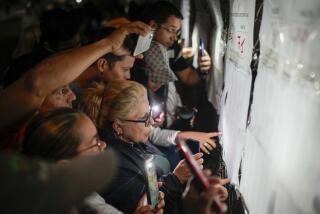Zimbabwe’s Presidential Election Off to a Slow Start
- Share via
BINDURA, Zimbabwe — Hundreds of thousands of Zimbabweans braved intense heat and long lines Saturday for a chance to vote in this southern African nation’s most contested presidential election.
Masses of people stood in silence under the shade of hats and umbrellas, or perched on camp chairs and stools. In some areas, the queues snaked for miles along sun-drenched streets as polling places accommodated fewer than 50 people an hour. At least 30 people were reported injured in a township of Harare, the capital, when police fired tear gas and rubber bullets at members of an irritated crowd who tried to force their way into a polling place.
Many polling places remained open past the scheduled 7 p.m. closing time Saturday, and voting was set to continue for another day today. But opposition politicians and local observers, voicing concern that time could run out before all of the country’s 5.6 million registered voters could cast their ballots, were appealing for an extension of the polls.
Ruling Party Criticized
The race pits incumbent President Robert Mugabe and his ruling Zimbabwe African National Union-Patriotic Front, or ZANU-PF, against Morgan Tsvangirai, a onetime trade unionist and the leader of the Movement for Democratic Change, or MDC. Mugabe has been president since Zimbabwe, formerly Rhodesia, attained independence from Britain in 1980.
Government critics charged Saturday that the slow pace of voting was engineered, a last-ditch attempt by the ruling party to ensure that the outcome would be in its favor.
“The intention, of course, is that you frustrate as many voters as you can,” Tsvangirai told reporters as he went on a stroll in Harare. “Mugabe is trying to move the goal posts to disenfranchise people, these people he thinks will vote against him.”
Before the election, the government reduced the number of polling places in urban areas, where the MDC dominates, and increased the number in rural areas, which have traditionally been strongholds of the ruling party.
Learnmore Jongwe, a spokesman for the MDC, said Saturday that the party had information that the government had instructed officials at urban polling places to slow down the voting process. He added that the opposition party’s election observers had come under severe harassment and that by midmorning, voting was proceeding without MDC representatives in at least 52% of rural polling places.
“We find this state of affairs completely unacceptable,” Jongwe said. “A people who have waited 22 years to vote for change cannot be denied the opportunity to vote at the eleventh hour.”
However, political analysts and human rights activists said the electoral process had been flawed long before Saturday because of attempts to tip the balance in Mugabe’s favor.
“The elections can never be free and fair,” said John Makumbe, chairman of the Zimbabwe branch of Transparency International, a corruption monitoring body. “The political playing field is not even.”
The election follows a campaign marred by violence, clashes and systematic intimidation that rights groups and relief workers have blamed largely on pro-government militants.
The MDC says 107 of its supporters were killed in the two years preceding Saturday’s vote.
Mugabe’s Moves
Mugabe used presidential powers to reinstate special laws overturned by the courts. Scores of opposition rallies were banned, and police were granted the right to stop any public gathering. Criticizing the president was criminalized, with freedom of the press in essence stifled.
A January voter-registration deadline was extended to March 3 but with no notification given to the opposition, which filed a last-minute challenge seeking the removal from the rolls of the late-registered voters. Only government agencies were allowed to offer voter education, giving the ruling party ample opportunity to spread its propaganda and disparage its foes.
Observers from six of the 15 European Union nations were banned by the government. Authorities also refused to accredit most of Zimbabwe’s independent monitors, many of whom showed up outside polling places anyway.
A former soldier heads the Electoral Supervisory Commission, and government-appointed employees fill the group’s ranks.
Two days before the vote, the commission still refused to say how many ballots had been printed or where polling places would be, leaving inadequate time for the opposition to deploy monitors.
But despite the controversy surrounding the electoral process, what monitors there were said the first day of voting progressed in an atmosphere of relative calm.
In the farming town of Bindura, a traditional ruling party stronghold about 40 miles north of Harare, voters flocked to the polls.
“It’s a chance in a lifetime,” said Prosper Mutandadzi, 30, an adult-education administrator. “You have to determine your future. Actually, this day has taken too long to come. It’s time for change.”
“The priority is restoring law and order in the country, as well as improving the lives of Zimbabweans in general,” said Wicklow Hwata, a real estate agent in his 20s.
The election comes amid a deepening economic crisis. Zimbabwe’s inflation has topped 110%, unemployment has surged to more than 60%, and hunger is widespread.
Tsvangirai, 49, is promising to revive the economy, alleviate the government corruption that has been blamed for the country’s financial collapse and restore the rule of law.
Mugabe, 78, says he will create jobs and promote black empowerment by continuing with a controversial land reform program based on seizing white-owned farms for redistribution to landless blacks.
That last pledge persuaded Annah Mubvumba to cast her vote for Mugabe.
“Land is important, because many people have nowhere to stay,” said Mubvumba, 53. “We are suffering. We have no food to eat. We want the land.”
More to Read
Sign up for Essential California
The most important California stories and recommendations in your inbox every morning.
You may occasionally receive promotional content from the Los Angeles Times.














